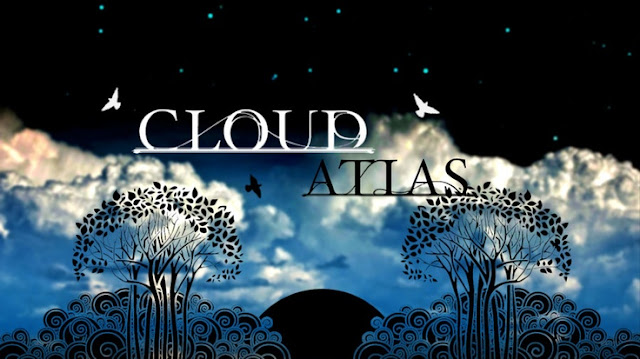I have been looking forward to blogging about this for ages.
I truly believe Cloud Atlas to be one of the greatest films ever made.
For that reason, I had to read the book.
I've been reading it since April. Not because it's bad, but because I've been working so hard that the only thing I'm capable of when I get home is sleeping. Made very slow progress, and it's not the sort of book you can offer only part of your attention.
Let's begin with how much this book spooked me:
- I read Gilgamesh whilst researching a novel. The same night, the chapter began by mentioning Gilgamesh.
- My great grandfather joined the War Graves Commission after the First World War and died tending graves at a Belgian cemetery he helped found, called Poelkapelle. Not a place oft mentioned. One of the characters in Cloud Atlas goes to the War Graves Commission at Zonnebeke and drives back past Poelkapelle.
- Finally, snuggled up to finish the book in the early hours. A character randomly mentions staying in Gloucester, which is where I happen to be.
Yes, reading too much into it, I know - but how can you not with a book like that?
For those who don't know Cloud Atlas by David Mitchell, it's really, really hard to explain.
The official blurb:
Souls cross ages like clouds cross skies...
Six interlocking lives - one amazing adventure. In a narrative that circles the globe and reaches from the 19th century to a post-apocalyptic future, Cloud Atlas erases the boundaries of time, genre and language to offer an enthralling vision of humanity's will to power, and where it will lead us.
It sort of ricochets through time, starting in the days of the slave trade with the journal of a seafaring notary, moving on to a young composer in the 30s, an investigative reporter in the 70s, a publisher in the present day, a genetically engineered 'fabricant' in the future, and a tribesman in the far, far future, after 'the fall'.
Then it moves backwards through each of those characters to the beginning again.
It is very complex and very clever.
But the book and the film have some major differences. I love them both, but for completely different reasons.
I will admit, sheepishly (because it feels like a crime against literature), that I think I prefer the film. Each story set gets tied up a bit neater in it, leaving you with a slightly more satisfied glow that things are as they should be - especially for Cavendish and Zachry.
The film is also very good at pulling out the poignant lines from the book and giving them pride of place. It slices out a few of the characters, to better effect. I did not mourn the loss of Eva. The relationship between Sixsmith and Frobisher reduces me to tears every time. Beautifully done.
It's a breathtakingly shot film. Bit like Life of Pi in scope.
I honestly think the collaboration of writers and cinematographers improved upon the original work. But then, I'm one of those weirdos who thought the 2005 version of Pride and Prejudice told it better than the book. And for that, I am sort of sorry.
I was a little surprised at just how wide the divergence was. With things like Game of Thrones or Dexter the changes (at least in the first series or so) are extremely minor. Cloud Atlas had a bit of a serious makeover.
All that said, here's why I loved the book.
From a writer's perspective - it is ingenious.
They talk about an actor's director, well, Mitchell is a writer's author.
The founding concept is brilliant. Tell six stories, split them up so you're telling the beginning of each, then the end of each, with one whole story in the middle. Throw it through time from the far past to the far future and back again, so that it resembles a collection of short stories tied together with overlapping threads.
Then - the really clever bit - don't just switch genres, but method.
Write in:
- Diary entries
- Letters
- A mystery novel
- Memoirs
- An interview
- Narration
And speak thickly in the voice of each character, inventing linguistic quirks such as - in the future - dropping the e from ex words: exit/xit, extinct/xtinct, excited/xcited. Or further in the future, after the fall, reverting to something reminiscent of creole, with its own slang.
Why words slink n' slide off a tongue, when we need them most? If my tongue'd been more bold, could I have stopped all that diresomes about to happen?
Even inventing new rules for apostrophes. Now that's craftsmanship. There's even a little phrase guide. Curio's in there, which I like, but it misses out my favourite, whoahsome.
Seriously - what a feat of writing.
Really glad I read it. Gave me a lot to think about regarding choices of literary style and character development. Not entirely sure what I'm going to read next, but it's unlikely to be as extraordinary.


No comments:
Post a Comment